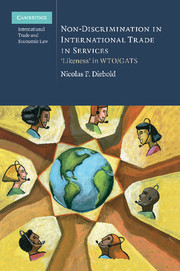Book contents
- Frontmatter
- Contents
- Foreword
- Acknowledgements
- Abbreviations
- List of Cases
- List of Legal Texts
- List of Documents
- Introduction
- PART I Foundations
- PART II Framing the conceptual breadth of ‘likeness’ in GATS
- PART III GATS specific ‘likeness’ issues
- 9 The scope of GATS rules on non-discrimination
- 10 ‘Likeness’ across ‘services’ and ‘suppliers’
- 11 ‘Likeness’ across ‘methods’ and ‘modes’ of supply
- 12 Concluding summary: merged test and crossover ‘likeness’
- PART IV Methodology for the ‘likeness’ analysis in GATS
- Bibliography
- Index
11 - ‘Likeness’ across ‘methods’ and ‘modes’ of supply
Published online by Cambridge University Press: 10 January 2011
- Frontmatter
- Contents
- Foreword
- Acknowledgements
- Abbreviations
- List of Cases
- List of Legal Texts
- List of Documents
- Introduction
- PART I Foundations
- PART II Framing the conceptual breadth of ‘likeness’ in GATS
- PART III GATS specific ‘likeness’ issues
- 9 The scope of GATS rules on non-discrimination
- 10 ‘Likeness’ across ‘services’ and ‘suppliers’
- 11 ‘Likeness’ across ‘methods’ and ‘modes’ of supply
- 12 Concluding summary: merged test and crossover ‘likeness’
- PART IV Methodology for the ‘likeness’ analysis in GATS
- Bibliography
- Index
Summary
The concept of ‘like services and service suppliers’ entails specific problems unknown to its GATT ‘like product’ counterpart. As explained under section 2.I above, services can be supplied by different ‘methods’ of supply and some GATS obligations only apply in relation to different ‘modes’ of supply. Failure to clearly distinguish modes from methods in relation to MFN and national treatment leads to confusion and incorrect conclusions, in particular with regard to the analysis of ‘likeness’. The two main questions are whether ‘likeness’ can exist across modes of service supply and/or across methods of service supply. Whereas the MFN cross-mode issue may entail supply by different methods and modes (below, III.), the only crossover issue arising under national treatment obligation concerns the supply by different methods (I.). A different issue resulting from a mode-based fragmentation of national treatment concerns the fact that certain foreign suppliers may benefit from a national treatment claim even though they use a mode of supply which is not subject to a commitment (II.)
Cross-method ‘likeness’ in national treatment
A national treatment analysis is based on the comparison between a foreign service that is supplied under one of the four modes of supply set forth in Article I:2 GATS and a service that is supplied domestically. Modes 1 to 4 define ‘trade in services’ as including a cross-border element, be it the service, the supplier or the consumer that crosses the border.
- Type
- Chapter
- Information
- Non-Discrimination in International Trade in Services‘Likeness' in WTO/GATS, pp. 220 - 237Publisher: Cambridge University PressPrint publication year: 2010



